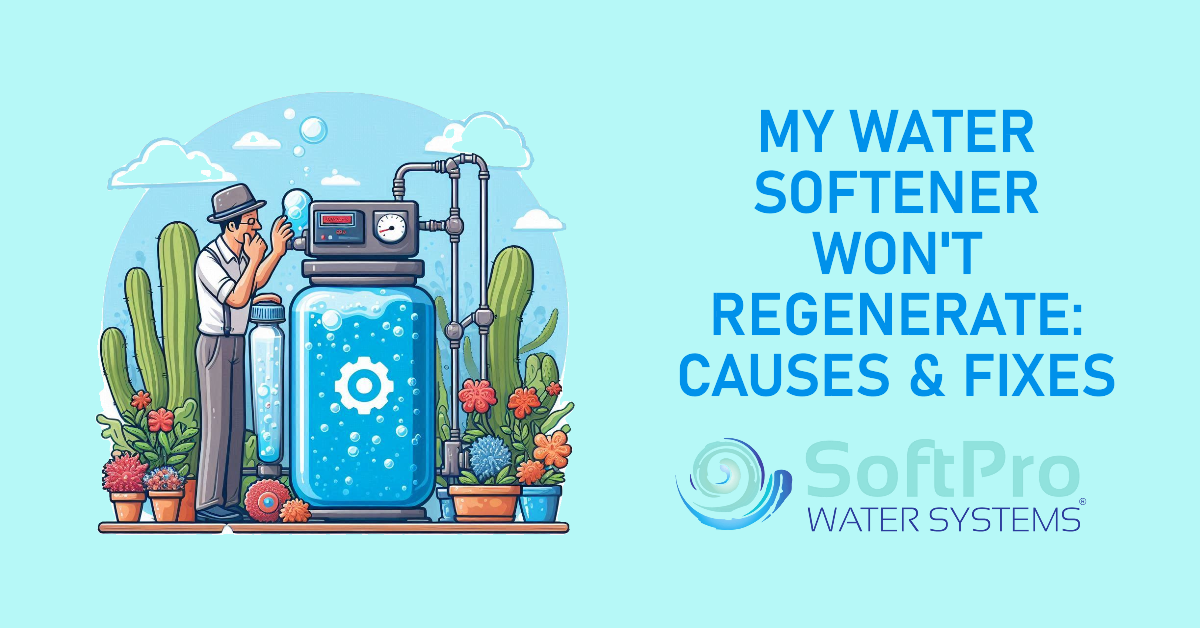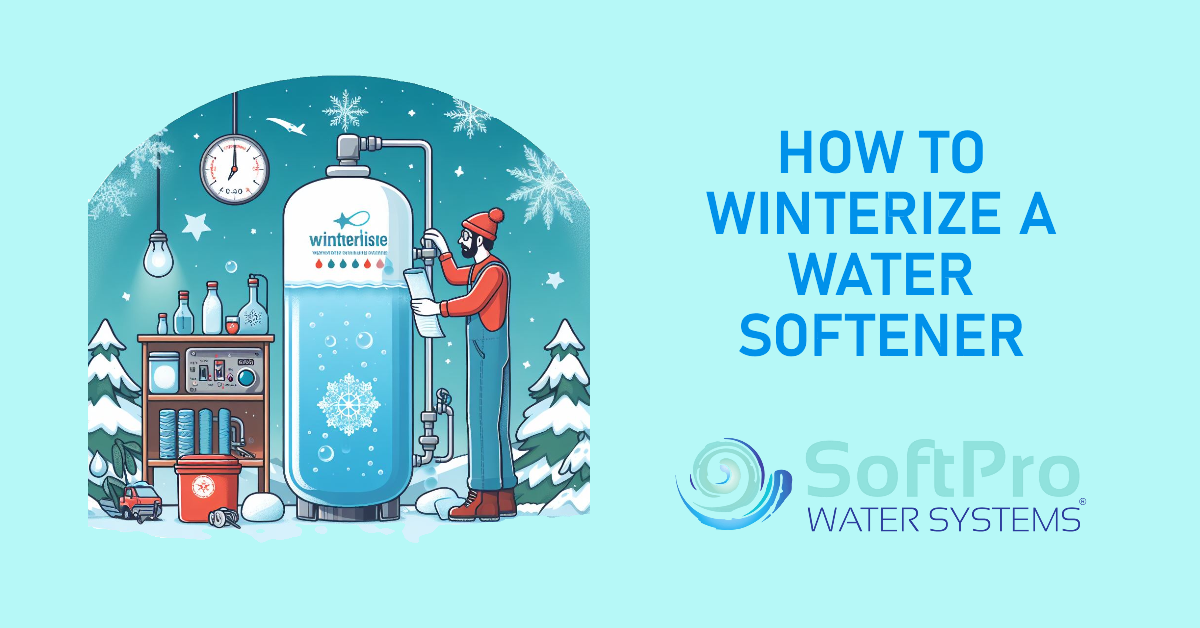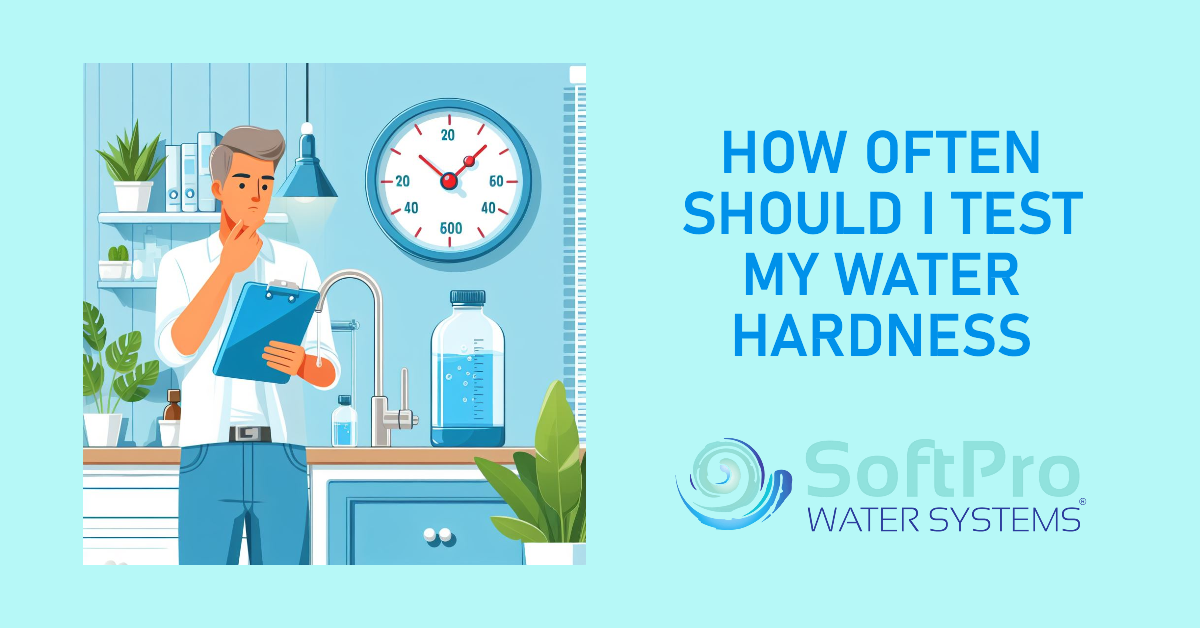My Water Softener Won't Regenerate: Causes & Fixes
Table of Contents
If your water softener won't regenerate, you're likely dealing with the return of hard water woes – spotty dishes, dry skin, and potential appliance damage. The most common reasons behind this problem include salt issues in your brine tank, faulty timers or motors, or clogged lines. Don't worry, many of these problems have straightforward DIY fixes.
Let's delve into what goes on when your water softener regenerates and why it's crucial for maintaining soft water. A water softener uses special beads called resin that attract and trap the hardness minerals (calcium and magnesium) from your water. Periodically, these resin beads need to be recharged through a regeneration cycle. During this process, a concentrated salt solution (brine) is drawn from the brine tank and flushed through the resin, washing away the hard water minerals and replenishing the resin beads. A successful regeneration is vital for keeping your water softener working its best.
Common Causes and Quick Fixes
Salt Problems
Salt is the lifeblood of your water softener, so when issues arise in your brine tank, it's often the first place to look. Here are the usual suspects:
-
Salt Bridges: Over time, humidity and lower-quality salt can cause a hard crust to form above the water level in your brine tank, preventing water from dissolving the salt below. You can usually break up a salt bridge yourself with a broom handle (carefully.). Regularly checking your salt levels and using higher-quality salt can minimize the recurrence of bridges.
-
Insufficient Salt: Your water softener needs enough salt to create the brine for regeneration. Low salt levels mean ineffective regeneration. Maintain a salt level a few inches above the water line and use the type recommended by your system (often evaporated or solar salt).
-
Mushy Salt: Humidity, low-grade salt, or overfilling can turn the salt at the bottom of your tank into a mushy, unusable mess. If you see this, you'll need to empty the tank, dispose of the mushy salt, clean the tank, and refill with fresh, high-quality salt.
Timer/Control Valve Issues
Your water softener's control valve is its brain, directing the regeneration process. Problems here can be trickier, but there are some DIY fixes:
-
Stuck Timer: Water softeners often regenerate based on a timer (e.g., every few days). If the timer gets stuck, regeneration won't happen. Most softeners let you manually trigger a cycle; if this works, you may need a timer replacement.
-
Faulty Motor: The control valve's motor powers the movement of water and brine during regeneration. If you hear no motor sounds during a scheduled cycle, a professional repair might be needed.
-
Power Outage Reset: Power surges can throw off your softener's settings. Double-check your timer and adjust it if necessary.
Clogs and Restrictions
Even the best water softener can be derailed by debris and blockages in its lines and valves. Here's what you need to check:
-
Drain Line Obstruction: The drain line carries away the mineral-rich water during the regeneration cycle. Kinks, clogs from debris, or even a wrong positioning can disrupt the process. Inspect the drain line's entire length, clear any visible obstructions, and ensure it's positioned correctly as per your softener's manual.
-
Clogged Resin Injector: Within your softener's control valve, a small component called the injector draws the brine into the resin tank. It has a tiny screen that can get clogged with debris or mineral deposits. Disassembling and gently cleaning the injector can often restore water flow. Consult your owner's manual for specific instructions, as systems vary.
Less Common Issues
While salt problems, timer malfunctions, and clogs cover the majority of regeneration failures, there are a few more culprits worth investigating:
-
Low Water Pressure: Your water softener relies on adequate water pressure to draw brine effectively during regeneration. If your house water pressure is consistently low (due to well pump issues or municipal restrictions), it could prevent proper regeneration. You may need a professional plumber to diagnose and address the root cause of your low pressure problem.
-
Resin Bead Depletion: The resin beads inside your water softener tank have a long lifespan, but not an unlimited one. After roughly 10-15 years, the resin can become worn out and unable to hold onto hardness minerals effectively. While not a DIY fix, professional resin replacement can restore your softener's function.
-
Control Valve Malfunctions: The control valve is a complex piece of machinery, and problems beyond a stuck timer or faulty motor can occur. If the valve itself isn't cycling properly, it may require a rebuild or even a complete replacement. This often calls for professional expertise to ensure the correct diagnosis and fix.
Complex issues can sometimes mimic the symptoms of simpler fixes. If you've tried the DIY solutions and your softener still refuses to regenerate, it's wiser to call a professional to avoid potentially damaging your system further.
When to Call a Professional
While a DIY approach is excellent for many water softener issues, there are times when professional assistance is the best course of action:
-
Complex Repairs: If you suspect major control valve malfunctions, have exhausted easier troubleshooting options, or feel uncomfortable with in-depth plumbing work, a qualified technician can efficiently diagnose and fix the problem.
-
Warranty Considerations: Attempting certain repairs yourself may void your water softener's warranty. Check your warranty terms before undertaking any work that could fall into this category.
-
Time Factor: If you need your soft water back immediately (think washing machine woes or guests arriving.), a professional can often provide a faster solution than further DIY attempts.
The Benefits of a Professional
- Expertise: Water softener technicians bring years of experience and specialized knowledge, tackling issues that might leave the average homeowner puzzled.
- Parts and Tools: Professionals arrive with the necessary parts and equipment, saving you the hassle of sourcing and potentially buying incorrect components.
- Peace of Mind: Opting for a professional repair provides reassurance that the job is done correctly and can help prevent further damage to your system.
When searching for a professional, look for a company experienced in water softeners and your specific brand if possible. Ask about warranties on their work, as this adds an extra layer of protection.
Preventing Future Regeneration Problems
An ounce of prevention is definitely worth a pound of cure when it comes to your water softener. Here's how to keep your system running smoothly:
-
Maintenance Schedule: Your water softener isn't set-and-forget. Regular salt replenishment, periodic brine tank cleanings (about twice a year), and an annual inspection (either DIY or by a professional) go a long way in catching problems early.
-
Salt Quality Matters Cheap, low-grade salt is a major culprit in salt bridges, clogs, and inefficient performance. Opt for high-purity evaporated or solar salt recommended for use in softeners.
-
Upgrading Systems: If your water softener is getting old or you have recurring problems, consider upgrading to a modern, demand-based system. These sophisticated softeners regenerate based on actual water usage patterns, saving you salt, water, and preventing over-cycling.
The Benefits of Proactive Maintenance
- Extending System Life: A well-maintained softener can last for many more years than a neglected one, offsetting the cost of replacements.
- Lower Utility Bills: An efficient softener reduces unnecessary regenerations, cutting back on salt and water waste, directly impacting your bills.
- Protecting Your Home: Unchecked hard water can damage appliances and pipes; prevention is easier and cheaper than repairs.
We always recommend using genuine components and following manufacturer instructions for maintenance on your specific water softener system. This ensures safe operation and helps things run optimally.
Your Water Softener, Working for You
Addressing a malfunctioning water softener is key to maintaining the soft water benefits you value. Often, this boils down to troubleshooting common issues like salt problems, timer malfunctions, or clogged lines – many of which you can successfully resolve yourself. However, don't hesitate to call in a pro for complex repairs, if time is a factor, or if you suspect problems with resin depletion or advanced control valve issues. Prioritizing preventative maintenance through regular checks, high-quality salt, and system upgrades helps prevent future headaches and keeps your water softener performing its best.
Key Takeaways
- Salt Matters: Insufficient, low-quality, or mushy salt significantly impacts regeneration.
- Timers and Valves are Crucial: Check the timer and listen for the motor during scheduled regenerations to pinpoint issues.
- Clogs Can Disrupt: Inspect the drain line and consider cleaning the resin injector to ensure good water flow.
- Don't Delay Pro Help: Opt for professional assistance when DIY troubleshooting fails or warranty considerations are in play.
- Prevention Pays Off: Regular maintenance and a potential system upgrade will save you time and money in the long run.
Is your water softener still not cooperating, or do you have lingering questions about maintenance?
Get the expert help you need for a smoothly running system and uninterrupted soft water. Contact SoftPro Water Systems for personalized guidance and solutions. Let us help you reclaim the benefits of soft, problem-free water in your home.






![SoftPro Chlorine+ Carbon Whole House Water Filter to Remove PFAS, Chlorine, Chloramine & Pesticides [City Water Filters Series]](http://www.softprowatersystems.com/cdn/shop/files/SoftPro_Whole_House_Carbon_Filter_Chlorine.webp?v=1769127507&width=140)
![SoftPro Iron Filter - Iron Master AIO - Best Iron Filter for Well Water [Air Injected Water Filter / Katalox]](http://www.softprowatersystems.com/cdn/shop/files/SoftPro_AIO_Iron_Master_-_Best_Whole_House_Iron_Filter_1b6d98eb-a7f7-4749-9306-7333a15685e9.webp?v=1769125508&width=140)













